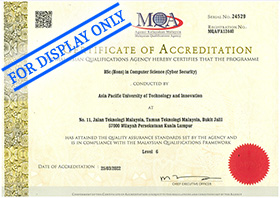You are here
Bachelor of Science (Honours) in Computer Science (Cyber Security)
|
|
|
APU-DMU DUAL DEGREE PROGRAMME |
MORE THAN JUST A COMPUTER SCIENCE DEGREE
APU's Bachelor of Science (Honours) in Computer Science (Cyber Security) degree is designed to provide you an edge with the latest technologies that are in line with the Industrial Revolution 4.0. |
ADMISSION REQUIREMENTS
GENERAL REQUIREMENTS | |
| DIRECT ENTRY TO LEVEL 1 OF THE DEGREE: | |
| STPM | • 2 Passes in STPM in Science stream with minimum Grade C (GPA 2.0) in Mathematics and one Science or ICT Subject. |
A-LEVEL | • 2 Passes (Grade A-D) in A-Level in Science stream with a Pass in Mathematics and one Science or ICT subject. |
| UEC | • 5 Grade B Passes in UEC in any subject including Mathematics and one Science or ICT subject. |
FOUNDATION/ | • A pass in Matriculation or Foundation studies with minimum CGPA of 2.0 with a Credit in Additional Mathematics at SPM/IGCSE/O-Level or its equivalent. Note: The requirement for the Additional Mathematics can be exempted if the Matriculation or Foundation offers Mathematics module which is equivalent or higher requirement than the Additional Mathematics at SPM level.
|
| DIRECT ENTRY TO LEVEL 2 OF THE DEGREE: | |
| ICT RELATED DIPLOMAS | • Diploma with a minimum CGPA of 2.50. Note: Student with CGPA above 2.0 and below 2.5 may be accepted using rigorous assessment conducted by APU and subject to the approval of the Academic Board. |
The above entry requirements may differ for specific programmes based on the latest programme standards published by Malaysian Qualifications Agency (MQA). The qualification and entry requirements for the programmes will be determined based on the "Comparison List of Equivalency of International Qualifications with SPM (O-Levels equivalent) and STPM (A-Levels equivalent)" published by Malaysian Qualifications Agency (MQA).
| ENGLISH REQUIREMENTS | |
INTERNATIONAL STUDENTS | • IELTS : 5.0 |
PROGRAMME OUTLINE
This programme is specifically designed to provide students with:
- The ability to develop technical knowledge, skills and background in the design and organisation of computer systems focusing on cyber security.
- The ability to critically evaluate design paradigms, languages, algorithms, and techniques used to develop complex software systems related to cyber security.
- The ability to evaluate and respond to opportunities for developing and exploiting new technologies and applications in cyber security.
DEGREE LEVEL 1 |
Students will learn fundamental skills required by every IT professional, and the basic understanding of programming, mathematical and algorithmic skills. A sound grasp of mathematical techniques and skills in algorithmic thinking are important pre-requisites for their second and third year studies in this area. Computer Architecture, operating systems, networks, databases, security and forensic technologies are the underlying platforms in cyber security. Introduction to management introduces the third key area, understanding personal and organisational development, along with independent learning and team working skills.
COMMON MODULES | |
|
|
SPECIALISED MODULES | |
| |
ELECTIVE MODULES (CHOOSE 1) | |
|
|
DEGREE LEVEL 2 |
A broader range of skills will be learnt, in which students will gain better understanding in Cyber Security related areas. The students should be flexible in performing a range of computing tasks using extended theories and practice related to Cyber Security. In the second year, the core modules deepen the understanding of platform technology, while specialised modules allow them to go further into system & network administration, computing theory, computer systems & low level techniques and implementation of secure systems.
COMMON MODULES | |
|
|
SPECIALISED MODULES | |
|
|
ELECTIVE MODULES (CHOOSE 1) | |
|
|
INTERNSHIP (16 weeks) |
Students will undertake an Internship/Industrial Training for a minimum period of 16 weeks to prepare them for a smooth transition from the classroom to the working environment.
DEGREE LEVEL 3 |
Students will draw on their previous studies and industrial experience to refine their personal and professional development in the field of computer science majoring in Cyber Security. Students will move further into Cyber Security by learning the core and specialised modules to enhance new skills and advanced knowledge on the current and future technologies. Elective modules are offered to strengthen their essential skills and knowledge. A final year project requires them to investigate and develop a solution for a real world problem. They will demonstrate the ability to combine technical knowledge, critical thinking, and analytical skills to produce personal achievement portfolio.
COMMON MODULES | |
|
|
SPECIALISED MODULES | |
|
|
ELECTIVE MODULES (CHOOSE 1) | |
|
|
MQA COMPULSORY SUBJECTS* |
|
|
(*All students are required to successfully complete these modules as stipulated by the Malaysian Qualification Agency.) | |
APU WINS CYBER SECURITY INNOVATION (EDUCATION) OF THE YEAR 2024 BY CYBERSECURITY MALAYSIA
We are thrilled to share the exciting news that APU has been honoured with the prestigious Cyber Security Innovation (Education) of the Year award by CyberSecurity Malaysia at the Malaysia Cyber Security Awards 2024 held at KLCC. | |
| |
| |
CAREER OPTIONS
|
|
COURSE FEES
Malaysian Students | International Students |
Year 1: RM 32,900 | Year 1: RM 33,600 (USD 7,815) |
* Fees stated here do not include Deposits and other Miscellaneous Fees. Please refer to Fee Guide for details.
MQA ACCREDITATION
(R/0613/6/0029)(08/29)(MQA/FA12440) |
Computing & Technology Degree Programmes |
- Bachelor of Science (Honours) in Information Technology
- Bachelor of Science (Honours) in Information Technology with a specialism in Information System Security
- Bachelor of Science (Honours) in Information Technology with a specialism in Cloud Engineering
- Bachelor of Science (Honours) in Information Technology with a specialism in Internet of Things (IoT)
- Bachelor of Science (Honours) in Information Technology with a specialism in Digital Transformation
- Bachelor of Science (Honours) in Information Technology with a specialism in Financial Technology (FinTech)
- Bachelor of Science (Honours) in Information Technology with a specialism in Business Information Systems
- Bachelor of Science (Honours) in Information Technology with a specialism in Sustainable Computing
- Bachelor of Science (Hons) in Software Engineering
- Bachelor of Science (Honours) in Computer Science
- Bachelor of Science (Honours) in Computer Science with a specialism in Data Analytics
- Bachelor of Science (Honours) in Computer Science with a specialism in Digital Forensics
- Bachelor of Computer Science (Hons) (Artificial Intelligence)








